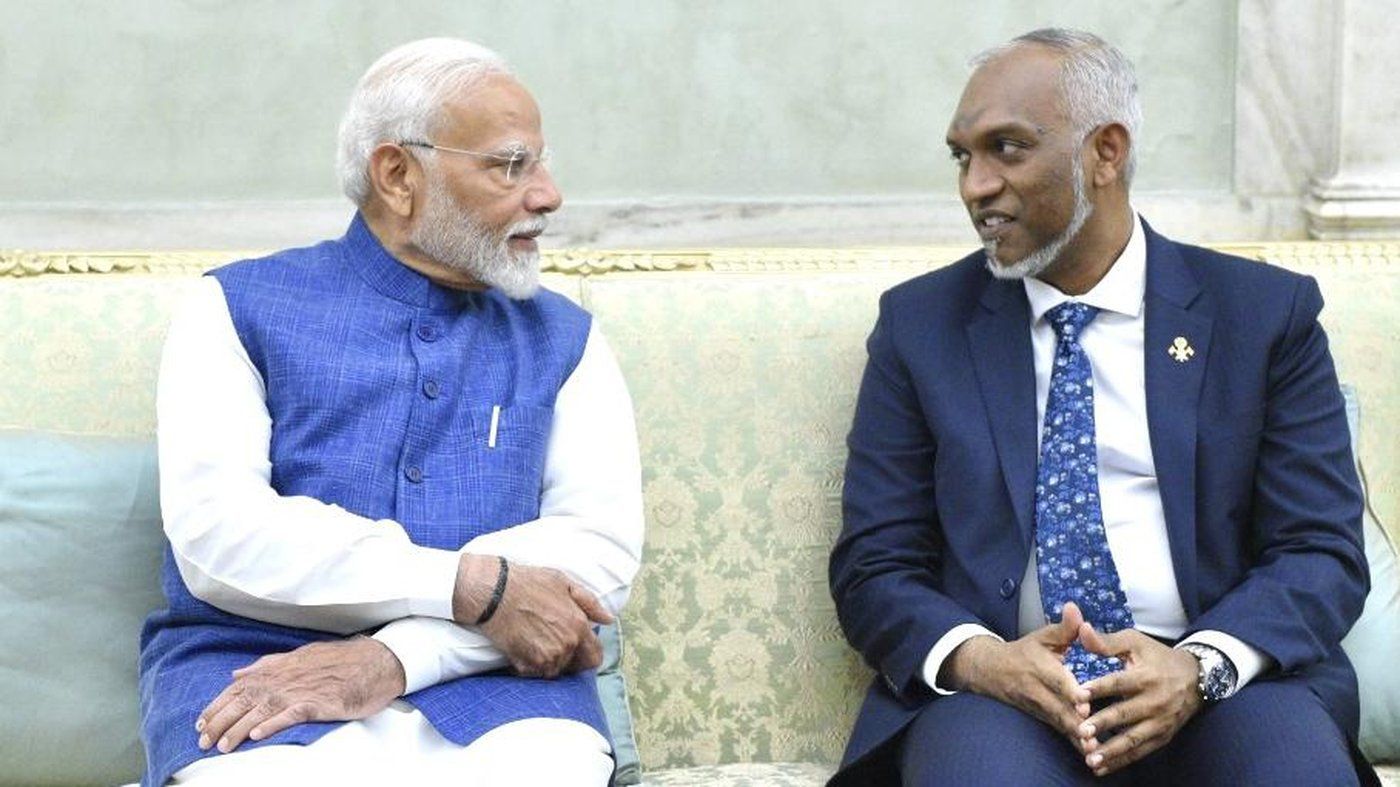The scene at Narendra Modi's inauguration dinner hosted by India's President Droupadi Murmu was one of triumph and relief for the re-elected Indian prime minister.
Following the fraught 2024 election, Modi was able to form government for a third consecutive term. Only this time, he would require a coalition between his Bharatiya Janata Party (BJP) and parties of the National Democratic Alliance (NDA)—as opposed to the previous majority government.
It meant that there were lots of people for Modi to thank. However, flanking him during the Presidential banquet were not his new coalition partners but Maldives president Dr Mohamed Muizzu.
Seen as being in the midst of a diplomatic row, India and Maldives had seen relations somewhat sour over the expulsion of Indian troops stationed at the idyllic Indian Ocean archipelago last year.
Now, Muizzu's presence at the inauguration dinner demonstrates a renewed trend of engagement between the two new governments.
What does Modi 3.0 mean for Maldives?
A re-elected Modi government is likely to see Maldives reassured of India's neighborhood policy and commitment as a regional net security provider.
Internationally, Modi's return can show stability and confidence in India's government and foreign policy.
For countries like Australia, this election outcome has refreshed India's ongoing commitment to promoting a free and open Indo-Pacific. Modi's foreign policy has aligned with Canberra, Washington and Tokyo's efforts to build a safe maritime environment between the Pacific and Indian Ocean regions.
This time around, unlike the previous BJP-focused approach, the dual-party coalition government could bring more balance to engagement and dialogue between domestic politics and foreign policy in India.
For Maldives, a coalition government could also mean an opportunity for a broadened engagement with India.
New terms for old friendships
Muizzu took office in November 2023 and implemented policy tools to prevent Maldives from being jostled in the ongoing great power competition, seen in the growing rivalry between India and China.
Muizzu's administration attempted to initiate a balanced approach to foreign affairs to avoid biased political alignments with any single foreign government.
His initial policies toward India, including the immediate withdrawal of Indian military troops based in Maldives, were seen as a countermeasure to India's alleged influence. This was an opening setback for Maldives-India cooperation.
However, Maldives-India relations have been grounded on strong historical and political bonds between the two. This has supported ongoing dialogue in multiple areas of cooperation, including Maldives' heavy reliance on India's aid and interpersonal relations.
The initial tension between the countries began to diminish once President Muizzu won a supermajority in a parliamentary vote which gave him the mandate and the support toto shape his India-focused foreign policy.
A fresh start
In May 2024, Maldives Foreign Affairs Minister Moosa Zameer and Indian External Affairs Minister Dr Subrahmanyam Jaishankar agreed to enhance bilateral talks and engagements.
India has been concerned about the potential security implications of the growing Maldives-China engagements. However, the change of Maldives' focus on China between different administrations has not radically changed the country's reliance on India's leadership in regional security matters.
Rather, stronger cooperation has continued on security matters.
India's regional leadership has reinforced engagement of the Indian Ocean small states. Maldives has been a benefactor of this.
Initiatives, such as the SAGAR doctrine — Security and Growth for All in the Region initiative — have brought small states into its strategic mapping of regional security architecture.
Invitations to the June 2024 inauguration speak to "India's strategic pragmatism" and SAGAR doctrine to expand its strategic cooperation beyond South Asia.
Being part of India's strategic affairs is important for Maldives. Historically it has been a maritime strategic location for this strategic pragmatism.
Muizzu's initial meeting with Modi at the sideline of the 2023 COP 28 — climate meeting in UAE — can be called a strategic move and a building block for a more harmonious approach to strengthen cooperation with Modi's government. Muizzu sought further reassurance by accepting the invitation to attend the inauguration in New Delhi.
The continuity of Modi's government can serve as a validation of the existing agreements between the two nations — India's major development and infrastructure projects in Maldives have increased, while Maldives has heavily relied on connections, socio-economic and financial support from India.
These need to be further strengthened by basic areas of cooperation, including food security, trade, tourism and development cooperation.
Regional security
In the coming years Maldives would potentially strengthen aid partnerships with new extra-regional actors, including expanding investment and development partnerships with China, serving the country's national development interest.
Regional security is a key area for Maldives to prioritize in its partnership with India. Maldives has been an active partner in regional security through Dosti, the trilateral maritime exercise between Maldives, India and Sri Lanka.
This continues to serve as a regional mechanism to enhance security and defence cooperation.
The Maldives anticipate further involvement in regional initiatives with India, including re-engaging dialogue with the Colombo Security Conclave and Indian Ocean Rim Association (IORA).
Working with India and its like-minded partners, like Australia, can help the Maldives achieve some level of small-state leadership in regional security.
(The author is a PhD candidate at The Australian National University. His focus is on international relations and security of small island developing states (SIDS). This article was originally published under Creative Commons by 360info)

